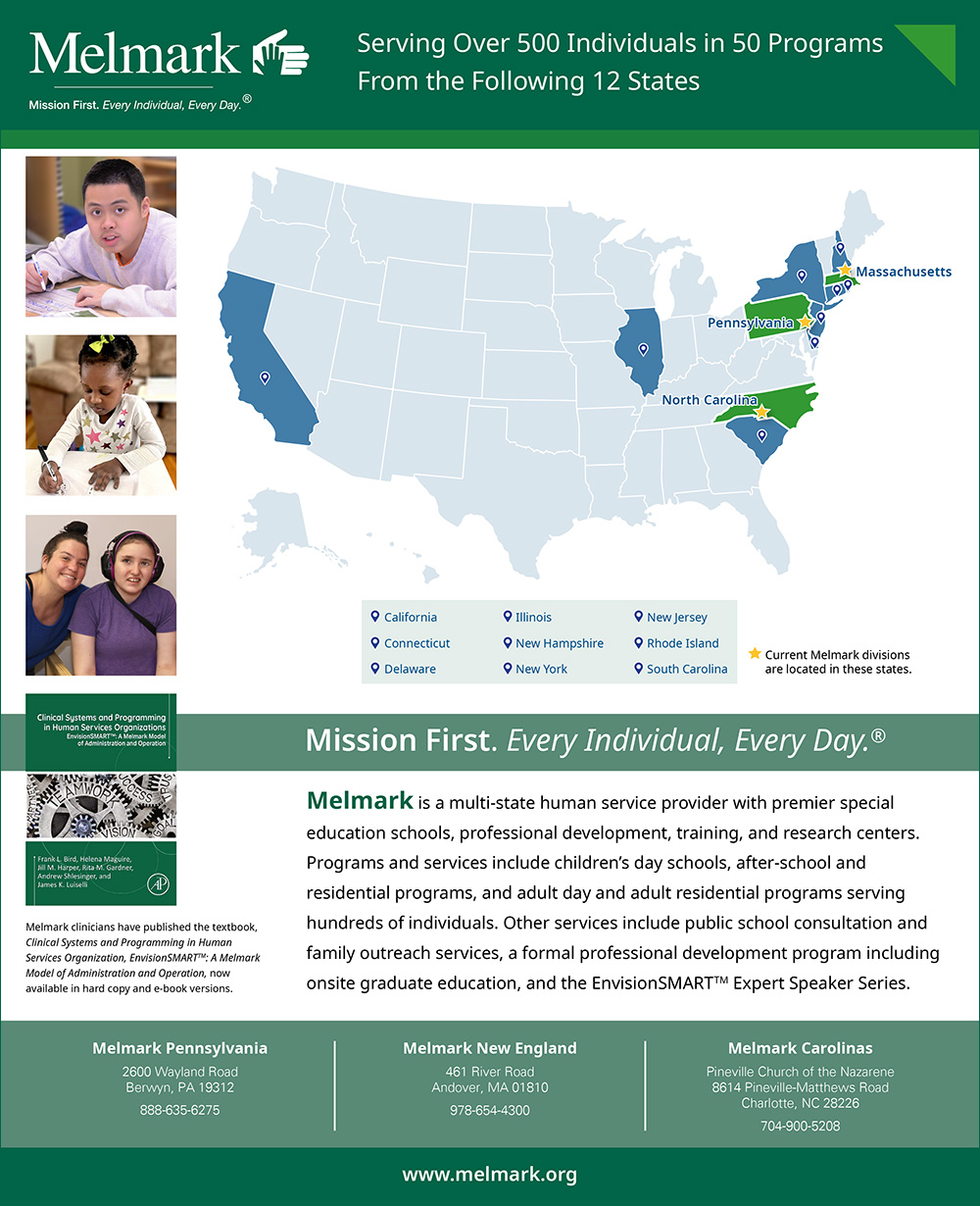Self-care is one of those buzzword phrases that often goes in one ear and promptly out the other. Well-meaning clinicians, and even the latest podcast gurus, talk about prioritizing self-care in a world that is constantly demanding more and more of your time and energy as a family member. We are in a time and space post-pandemic where attention to the importance of mental health is at an all-time high, and access to available resources is seemingly at an all-time low. In my role as the Director of Admissions and Family Services at Melmark, I hear from family members everyday who are struggling to identify appropriate resources for their loved ones while making do with what little support they are able to drum up. Most of the time parents are picking up the slack to the detriment of their own health and well-being. Families of the children that we serve often have identified needs outside of educational settings, and yet there are significant gaps in the provision of services and providers across the board. This means caregivers are spending a great deal of time exploring any viable options of support for their loved one. But what about support for themselves? This piece of the equation is often missing, leading to an entirely new series of challenges for caregivers. Helping families understand how self-care is critical to their children’s success is increasingly important.

First, what is self-care? There is a multitude of definitions out there; however, I found the one offered by Gorsky (2014) to be simple yet comprehensive. Gorsky identifies self-care as those practices that include maintaining one’s own health and wellbeing, actively seeking support, and maintaining some activity apart from one’s caregiving duties. Breaking down self-care into these three parts makes this large idea seem more manageable. How are you supporting your own health and well-being? How are you seeking support? And finally, what does life look like outside of being the parent/caregiver? Perhaps one of these areas is easier to focus on than another, but all three deserve attention if caregivers are to keep themselves in good enough shape to continue caring well for their children.
In order to get on board with self-care, it’s helpful to understand what’s in it for you, and to identify how your self-care can be beneficial to your loved ones, including those with special needs. Why would you spend time to care for yourself when there are so many other things that take priority? The answer is rather simple – you cannot give what you do not have. Merluzzi et al. (2011) suggest that improving self-care allows space for parents and caregivers to manage more of the family’s needs. When attention is given to supporting your own needs, increased focus and care can be given to the tasks at hand. When you have had adequate sleep or have taken a few minutes to step away and focus on the present situation, you can free up some reserves that may be needed elsewhere. It sounds counterintuitive, but it really works. Many times children are involved in evidence-based programs that are dependent on the interaction and engagement of the parents in order to provide consistency for success (Seymour, et al. 2013). Therefore, one could argue that when you take time to care for yourself, you are actually improving the likelihood that you will have the reserves needed to help your child through their programming. It becomes more of a win-win situation when you start small and practice ways to reach these goals of improved self-care.
Given the limited number of hours in the day, you may be wondering how this self-care business is supposed to work. We know that kids often thrive on structure, and that they are adaptable. If you begin to slowly add time in the day for your own breaks, they will learn that these breaks and times are important. This practice also models appropriate self-regulation and the importance of recognizing when to take a step back to identify what you may need.
It’s easy to identify what gets in the way of making your own mental and physical health a priority. Parents have endless amounts of tasks that need to be checked off the list. Fatigue, lack of resources and time, and self-blame are just a few of the reasons most noted to usurp self-care efforts (Serrata, 2012; Gorsky, 2014; Merluzzi, et al. 2011). Disruptions in sleep can have a significant impact in functioning, both for you and your child. Limited resources in terms of available quality care providers, as well as funds for those supports, are often a challenge for families. Right now there is a nationwide shortage of qualified providers of care, and this shortage has meant that a lot of families are providing more and more of the care to their family members at their own expense. In some cases, caring for a child, or a young person who has just exhausted their school-based entitlement (to free and appropriate education), can be a full-time job with an ever-changing job description that seems impossible to master. This can lead to feelings of guilt around taking any time for self-care. It may seem selfish to spend time on yourself, and this mindset can limit your interest and desire to seek out self-care opportunities.
I facilitate a monthly Sibshop program, and I was so pleased to learn that a few of the parents were dropping their children off to group and then heading out to a local restaurant for some much-needed time away from the demands of the day. They often report that they look forward to this time for their kids to have support, but also for them to be able to refill some of their reserves by spending time with other parents and lending support and care to one another. This is a great example of how to maximize time and resources to benefit self-care. Perhaps this is a strategy that might work for you.
Other areas of focus that may support increased self-care opportunities are family training, resource sharing, and system resources that can assist the whole family. With training, families are better equipped to manage the daily needs of their children by increasing the consistency of programming across settings. Training for family members can also improve the likelihood that interventions would be successfully generalized into the home setting, thus reducing the overall demand for time and resources from the parent. It is important to also recognize the limits of what care some family members are able to provide, whether because of age, external responsibilities, or other reasons. It is equally important to show some grace when a resource deemed less “appropriate” must be utilized. For instance, sometimes a tablet is the best option to occupy a child’s time, depending on what tasks must be completed at that time; food via the drive-through may sometimes be a caregiver’s only option for dinner. When parents can let go of some of the guilt, shame, and judgment surrounding decisions like these and generally how they parent, they can also free up resources for other areas of focus.
Resource sharing is another way to work toward a model of self-care. This approach can include partnering with another family to identify times when the families can help each other. For some of my families, this looks like a few hours on a Saturday where the kids are dropped off to someone else for a little bit, and then this is reciprocated for the other family when needed. While their way of providing help might not be the way you would do it, if your child is healthy and safe, a few hours away from you with someone else equipped to care for them won’t hurt and will likely benefit you and your entire family greatly.
System resources are another way to approach an increased focus on self-care. Many apps offer meditations for various lengths of time, providing small respites from your day-to-day routine as a caregiver. Even simple things like listening to music, watching funny pet videos, or just playing your favorite game on your phone or tablet can provide a much-needed brain break.
When it comes to self-care, there is no one-size-fits-all approach, and it’s important to note that it will take time to establish a new routine to shift your focus of care to a better balance. Start small and build as you feel comfortable, and you’ll soon feel more refreshed and ready to take on those bigger challenges with a healthier mindset. Breaking down self-care into smaller manageable tasks and options helps us not get stuck in thinking that conditions have to be perfect in order to take a moment for ourselves. You can build these daily moments into your day, every day, through family training, resource sharing, and system processes. When our routine only serves the individuals with special needs in our lives, we all run the risk of burnout, fatigue, and sometimes even detrimental outcomes for our loved ones, including ourselves. Assuring that time and attention are paid to the unique needs of each family member sets everyone up for success.
In conclusion, it is not lost on me that most of us don’t pay attention when the airline personnel remind us to put on our own mask before helping others. I do not suggest that incorporating self-care strategies into your already busy routine is easy to do. But what I can tell you is that the small investments made over time to develop these practices can yield results that may pay huge dividends later within yourself and your family. You are worth these efforts, and all the time and attention needed to get started with the first step.
Suzanne Muench, MSS, LCSW, is Director of Admissions and Family Services at Melmark and can be contacted at smuench@melmark.org or (610) 325-2937. For more information about Melmark, visit www.melmark.org.
References
Gorsky, S. (2014). Self-Care Strategies Among Parents with a Child Diagnosed with Autism Spectrum Disorder. Electronic Theses, Projects, and Dissertations. https://scholarworks.lib.csusb.edu/etd/14/
Merluzzi, T. V., Philip, E. J., Vachon, D. O., & Heitzmann, C. A. (2011). Assessment of self-efficacy for caregiving: the critical role of self-care in caregiver stress and burden. Palliative & Supportive Care, 9(1), 15–24. https://doi.org/10.1017/S1478951510000507
Serrata, C. A. (2012). Psychosocial Aspects of Parenting a Child with Autism. Journal of Applied Rehabilitation Counseling, 43(4), 29–35. https://doi.org/10.1891/0047-2220.43.4.29
Seymour, M., Wood, C., Giallo, R., & Jellett, R. (2012). Fatigue, Stress and Coping in Mothers of Children with an Autism Spectrum Disorder. Journal of Autism and Developmental Disorders, 43(7), 1547–1554. https://doi.org/10.1007/s10803-012-1701-y






